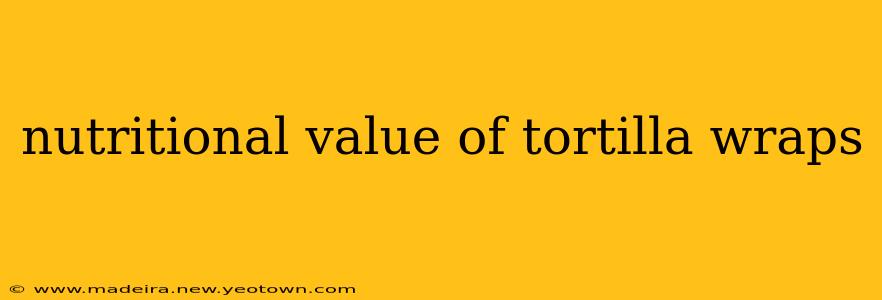Tortillas, those ubiquitous flatbreads, are culinary staples across the globe, forming the foundation of countless meals. But beyond their versatility, what’s the real nutritional story behind these seemingly simple wraps? Let's unravel the facts, separating the hype from the wholesome truth. This isn't just a quick glance at the nutrition label; we're diving deep into the different types, the impact of ingredients, and how to make the most nutritious choices for your health.
What is the nutritional value of a tortilla wrap?
The nutritional value of a tortilla wrap varies wildly depending on several factors: the type of flour used (corn, wheat, whole wheat), the size, and any added ingredients. A standard 6-inch flour tortilla might offer around 100-150 calories, with a mix of carbohydrates, a small amount of protein, and minimal fat. However, whole wheat tortillas often boast a higher fiber content and slightly more protein, contributing to better satiety and digestive health. Corn tortillas, beloved for their subtly sweet taste, typically contain less protein than their wheat counterparts but are naturally gluten-free.
Imagine this: you're choosing between a quick lunch of a simple chicken salad wrap and a heavier, more calorie-dense meal. Understanding the nutritional baseline of your tortilla is the first step to making informed choices about the rest of your meal.
Are corn tortillas healthier than flour tortillas?
This is a frequently asked question, and the answer isn't a simple yes or no. Corn tortillas, being naturally gluten-free, are a great option for individuals with celiac disease or gluten sensitivities. They also tend to be lower in calories and fat than flour tortillas. However, flour tortillas, particularly whole wheat varieties, often pack a bigger fiber punch, leading to better digestion and potentially better blood sugar control. Ultimately, the "healthier" choice depends on your individual dietary needs and preferences.
Think of it like choosing between two different running shoes – both get you to your destination, but one might be a better fit for your feet (and your dietary goals).
How many calories are in a small tortilla wrap?
The calorie count depends on the size and type of tortilla. A small (6-inch) flour tortilla might contain around 100-150 calories. Smaller corn tortillas could have slightly fewer, while larger wraps naturally contain more calories. It's always best to check the nutritional information on the specific brand and size you're using. Remember that those added extras, like cheese, meats, and spreads, will significantly impact your overall calorie intake.
It's not just about the tortilla itself; it's the whole package. A simple wrap can quickly become a calorie bomb depending on the fillings you choose.
What are the health benefits of tortilla wraps?
While not a nutritional powerhouse on their own, tortillas can contribute to a healthy diet. Whole wheat tortillas, in particular, offer a good source of fiber, aiding digestion and promoting regularity. The fiber also helps regulate blood sugar levels, preventing those energy crashes. Corn tortillas, meanwhile, are a good source of certain vitamins and minerals, depending on the preparation methods.
It's the building blocks, not just the base. Think of the tortilla as a canvas for your nutritional masterpiece; the right toppings and fillings can turn it into a healthy and satisfying meal.
Are whole wheat tortillas better than flour tortillas?
Generally, yes. Whole wheat tortillas boast a significantly higher fiber content than their refined flour counterparts. This extra fiber promotes gut health, aids in digestion, and contributes to feelings of fullness, potentially helping with weight management. They also tend to have a slightly higher protein content, adding to their overall nutritional value. However, the taste and texture might be different, so personal preference plays a role.
The choice isn't always black and white. Understanding the subtle nutritional differences empowers you to make a choice that best suits your needs.
This journey into the world of tortilla nutrition reveals that it’s not just about the wrap itself, but the context of your entire meal. Making informed choices, considering the type of tortilla, its size, and the accompanying ingredients, allows you to enjoy this versatile food while prioritizing your health and wellbeing. So, the next time you reach for a tortilla, you can do so with a clearer understanding of its nutritional value and its place in a balanced diet.

